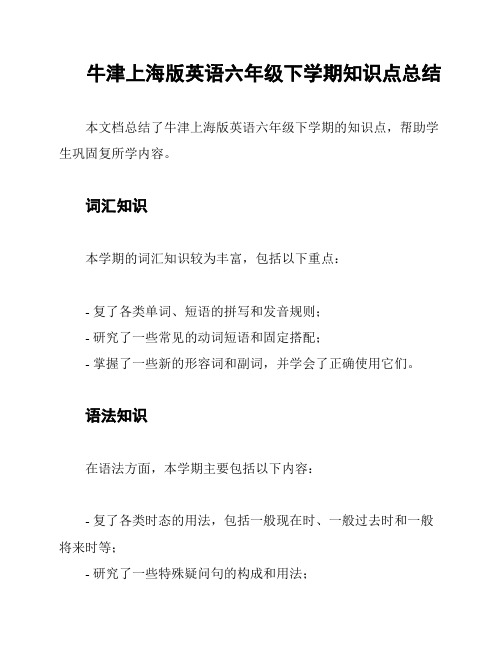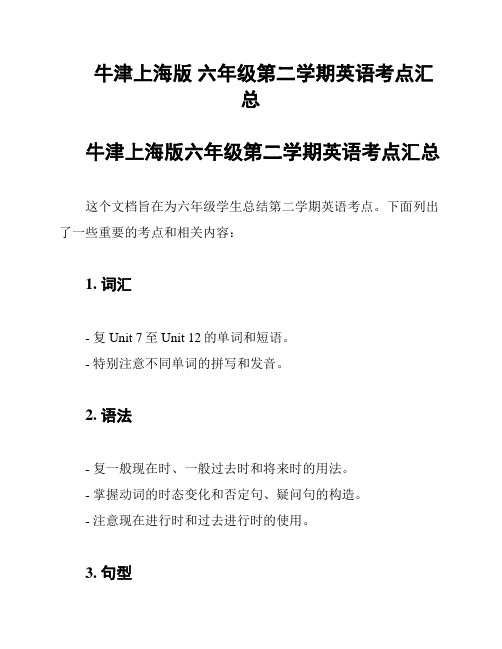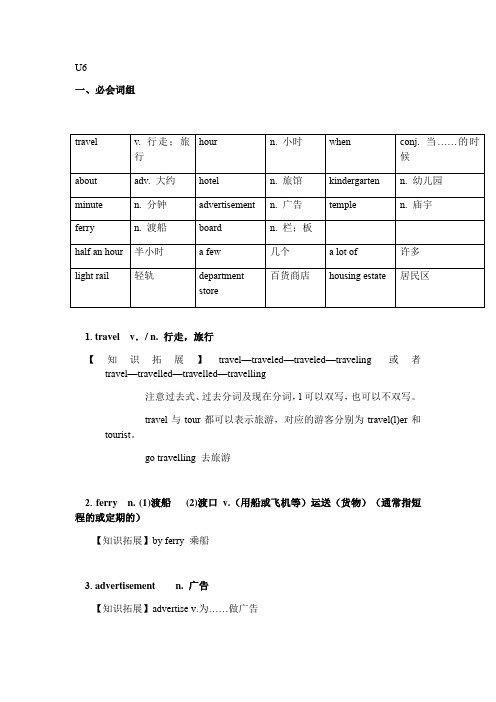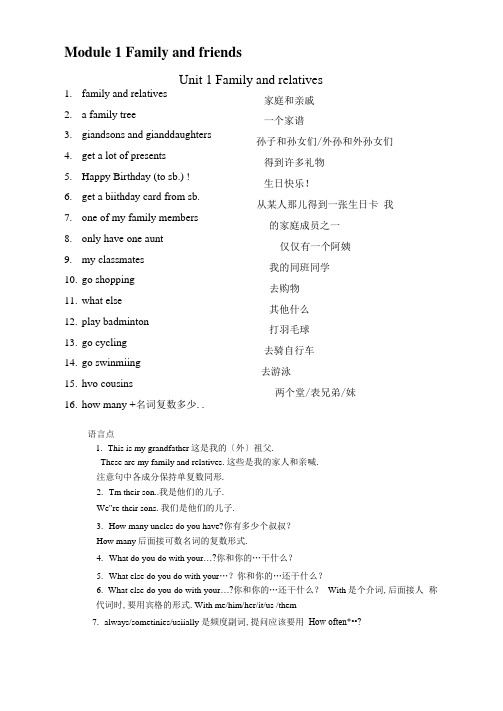上海英语牛津六年级知识点
牛津上海版英语六年级下学期知识点总结

牛津上海版英语六年级下学期知识点总结
本文档总结了牛津上海版英语六年级下学期的知识点,帮助学生巩固复所学内容。
词汇知识
本学期的词汇知识较为丰富,包括以下重点:
- 复了各类单词、短语的拼写和发音规则;
- 研究了一些常见的动词短语和固定搭配;
- 掌握了一些新的形容词和副词,并学会了正确使用它们。
语法知识
在语法方面,本学期主要包括以下内容:
- 复了各类时态的用法,包括一般现在时、一般过去时和一般将来时等;
- 研究了一些特殊疑问句的构成和用法;
- 掌握了简单句和复合句的结构和连接方式。
阅读技巧
研究英语的过程中,阅读技巧尤为重要。
本学期的阅读内容主要包括:
- 阅读短文理解文章大意;
- 提炼短文中的关键信息;
- 理解并回答问题。
书写规范
书写规范是英语研究中不可或缺的一部分。
本学期重点培养了学生的书写规范,包括:
- 规范的字母大小写;
- 字母书写的方向和连写规则;
- 单词之间空格的正确使用。
通过本文档的总结,希望学生们能够回顾所学的知识点,强化理解和记忆,提高自己的语言运用能力。
牛津英语(上海版)6年级上学期知识点罗列(1)

牛津英语(上海版)6年级上学期知识点罗列(1)1. family 表示家庭的时候,它是单数名词表示家庭成员的时候,它是复数名词Tom’s family is a happy one. 家庭The Wang’s family go to America every year. 家庭成员FAMIL Y: F ather a nd m other I l ove y ou.2. grandfather 爷爷great-grandfather 曾祖父granddaughter 孙女great-granddaughter 曾孙女3. classmate 同学deskmate 同桌workmate 同事roommate 室友schoolmate 校友4. get sth. from sb. 从某人那里得到某物He doesn’t get any money from his parents.5. 频度副词always, usually, often, sometimes, seldom, never频度副词的位置:放在行为动词之前,be动词之后I sometimes watch TV with my grandmother.He is always late for school.6. What else do you do with her?What else 还有什么Who else will he meet? 他还要见谁?Where else will you go?---- else 用于特殊疑问词之后Anything else? 还有什么东西么?Anyone else? 还有谁么?1. exciting 令人兴奋的,使人激动的---通常修饰事物excited 感到兴奋的,感到激动的---通常修饰人interesting – interestedboring – bored 无聊的surprising – surprised 惊奇的2. who 主格whom 宾格whose 所有格My grandparents usually go to see a film with my mother. 对划线部分提问Who/Whom do your grandparents usually go to see a film with?3. Watching TV is one of the most important activities of the day.动名词短语做主语。
牛津上海版 六年级第二学期英语考点汇总

牛津上海版六年级第二学期英语考点汇
总
牛津上海版六年级第二学期英语考点汇总
这个文档旨在为六年级学生总结第二学期英语考点。
下面列出了一些重要的考点和相关内容:
1. 词汇
- 复Unit 7至Unit 12的单词和短语。
- 特别注意不同单词的拼写和发音。
2. 语法
- 复一般现在时、一般过去时和将来时的用法。
- 掌握动词的时态变化和否定句、疑问句的构造。
- 注意现在进行时和过去进行时的使用。
3. 句型
- 复基本句型:主语+谓语+宾语。
- 研究一些常用的短语和句型,如“Can you...?"、"I can't..."、"How often do you...?"等。
4. 阅读理解
- 阅读并理解课文中的重要信息和细节。
- 学会根据上下文猜测词义。
- 提高阅读速度和阅读理解能力。
5. 口语表达
- 多参与口语练,提高口语表达能力。
- 学会用英语进行日常交流,包括问候、介绍自己、描述事物等。
6. 听力训练
- 提高听力理解能力,通过听力练来听懂并理解对话和短文。
- 学会根据听到的内容回答问题。
以上是牛津上海版六年级第二学期英语的考点汇总。
希望这份文档对大家备考有所帮助。
祝你们考试顺利!。
牛津上海版英语六年级上册Unit6知识点及语法点

U6一、必会词组1. travel v./ n. 行走,旅行【知识拓展】travel—traveled—traveled—traveling或者travel—travelled—travelled—travelling注意过去式、过去分词及现在分词,l可以双写,也可以不双写。
travel与tour都可以表示旅游,对应的游客分别为travel(l)er和tourist。
go travelling 去旅游2. ferry n. (1)渡船(2)渡口v.(用船或飞机等)运送(货物)(通常指短程的或定期的)【知识拓展】by ferry 乘船3. advertisement n. 广告【知识拓展】advertise v.为……做广告4. board n. 栏;板【知识拓展】abroad adv. 在国外,到国外。
broad adj. 宽广的。
形象记忆board这个单词:首尾bd两个字母想象成船头和船尾,中间oar是一个单词,意思是“桨”,所以board有“甲板,上船”的意思。
5. a few 几个。
a few只能修饰可数名词复数形式,与之对应的是a little, 只能修饰不可数名词。
练习:I.Read and complete the sentences.(根据给出的首字母,完成句子。
)1. I have been to Jing’an T .It's in the centre of Shanghai.2. My father’s office is far away from home. He goes to work by l r every morning because it is fast.3. Mum likes going to some department s at weekends.4. We live in a new h e . It's large and beautiful.keys: 1.Temple 2.1ight rail 3.stores 4.housing estate 【乘坐交通方式表达】乘坐交通工具的表达:by bus/by car/by underground/by bike/by plane/by ferry /on foot乘公共汽车/乘小汽车/乘地铁/骑自行车/乘飞机/乘轮渡/步行。
上海牛津英语六年级第二学期6B英语知识点汇总U1-U9

六年级第二学期牛津英语知识点梳理Unit One Great cities in Asia打*的知识点仅供参考知识点梳理:I 词组1. at an exhibition 在展览会上2. the capital of China 中国的首都3. north-east of Shanghai 在上海东北面east/ west/ south / north of 在……的东、西、南、北面north-east /north-west of 在……的东北、西北south-east /south- west of 在……东南,西南* in/on/to the east ofeg. Shanghai is in the east of China.Korea is on the east of China.Japan is to the east of China.3. how far 多远4. how 如何/怎样5. how long 多久6. in the past 在过去7. other places 其他城市8. from shanghai to Beijing 从上海到北京9. read some information about Beijing 阅读关于北京的信息10. the Great Wall 长城* the Summer Palace 颐和园* the Palace Museum 故宫博物院11. more than= over 超过* less than = under 少于12. 15 million people 一千五百万人*millions of, thousands of13. huge department store 大型百货公司*huge= very big14. spicy food 辣的食物15. in Asia 在亚洲16. great cities= big cities 大城市17. which city 哪个城市18. by plane=by air; 乘飞机by ship=by sea; 乘船by train/ ferry 乘火车/ 渡轮19. That’s right. 对的。
沪版牛津英语六年级上知识点整理

Module 1 Family and friendsUnit 1 Family and relatives1.family and relatives 家庭和亲戚2. a family tree 一个家谱3.grandsons and granddaughters 孙子和孙女们/外孙和外孙女们4.get a lot of presents 得到许多礼物5.Happy Birthday (to sb.) ! 生日快乐!6.get a birthday card from sb. 从某人那儿得到一张生日卡7.one of my family members 我的家庭成员之一8.only have one aunt 仅仅有一个阿姨9.my classmates 我的同班同学10.go shopping 去购物11.what else 其他什么12.play badminton 打羽毛球13.go cycling 去骑自行车14.go swimming 去游泳15.two cousins 两个堂/表兄弟/妹16.how many + 名词复数多少……语言点1. This is my grandfather.这是我的(外)祖父。
These are my family and relatives.这些是我的家人和亲戚。
注意句中各成分保持单复数同形。
2. I‟m their son.. 我是他们的儿子。
We‟re their sons.我们是他们的儿子。
3. How many uncles do you have?你有多少个叔叔?How many后面接可数名词的复数形式。
4. What do you do with your…?你和你的…干什么?5. What else do you do with your…?你和你的…还干什么?6. What else do you do with your…?你和你的…还干什么?With是个介词,后面接人称代词时,要用宾格的形式。
上海版牛津英语6A知识点整理

Module 1 Family and friendsUnit 1 Family and relatives1.family and relatives2. a family tree3.giandsons and gianddaughters4.get a lot of presents5.Happy Birthday (to sb.) !6.get a biithday card from sb.7.one of my family members8.only have one aunt9.my classmates10.go shopping11.what else12.play badminton13.go cycling14.go swinmiing15.hvo cousins16.how many +名词复数多少..家庭和亲戚一个家谱孙子和孙女们/外孙和外孙女们得到许多礼物生日快乐!从某人那儿得到一张生日卡我的家庭成员之一仅仅有一个阿姨我的同班同学去购物其他什么打羽毛球去骑自行车去游泳两个堂/表兄弟/妹语言点1.This is my grandfather这是我的〔外〕祖父.These are my family and relatives.这些是我的家人和亲喊.注意句中各成分保持单复数同形.2.Tm their son..我是他们的儿子.We"re their sons.我们是他们的儿子.3.How many uncles do you have?你有多少个叔叔?How many后面接可数名词的复数形式.4.What do you do with your…?你和你的…干什么?5.What else do you do with your…?你和你的…还干什么?6.What else do you do with your…?你和你的…还干什么?With是个介词,后面接人称代词时,要用宾格的形式.With me/him/her/it/us /them7.always/sometinies/usiially 是频度副词,提问应该要用How often*••?Unit 2 I have a good friend1.help each other 互相帮助2.help other people = help others3.not...at all4.go out at night5.like to be together6.walk to school together7.be friendly8.be helpful9.work hard = study hard10.be late for school11.get angiy12.be kind to others13.share sth. with sb.14.be never naughty 从不淘气15.never tell a lie/lies16.a visit to sp.帮助别人根本不在晚上出去喜欢在一起一起走去学校友好的有帮助的努力学习上学迟到变得生气对别人友善的和某人分享某物从不说谎一次去某地的参观17.live ill the USA = live in America 居住在美国18.visit sp. for the first time19.ask sb. about sth.20.hai,e/has been to sp.21.Ocean Park22.Garden City Zoo23.Water World24.Friends of the Earth25.look after = take caie of26.look after the environment27.all the things round us28.pollute the air 第一次参观某地询问某人关于某事曾去过某地海洋公园花园城市公园水上世界地球的朋友照顾,照看照顾环境我们周围所有的东西污染空气29.ak pollution30.water pollutionnd pollution32.keep sth. clean33.pick up34.put nibbish into mbbish bins35.tell sb. to do sth.36.tell sb. not to do sth.37.leave nibbish38.want to be/become39.want to do sth.40.promise to do sth.41.promise not to do sth.42.our promises 43.discuss sth. with sb.44.reuse shopping bags空气污染水污染陆地污染保持某物干净捡起,拾起把垃圾放入垃圾箱告诉某人做某事告诉某人不要做某事留下垃圾想要成为想要做某事承诺做某事承诺不要做某事我们的承诺和某人讨论某事再使用购物袋……怎么样?语言点:1.always/sometimes/usually/never 是频度副词.在句中的位置是:放在行为动词的前面,放在be动词的后面.也可以说“行前系后〞.She is always kind.她总是很善良的.She always helps other people.她总是帮助其他人.不能出现这样的句子:She is always helps other people.(X )一句话中不能同时出现两个动词.并且要注意主谓保持一致,尤其注意第三人称单数不可以忽略.2.They like to be together,他们喜欢在一起.like to do sth.=like doing sth.喜欢做某事He likes to play football.=He likes playing football,他喜欢踢足球.3.She can u t read or write.她既不会读也不会写,or用在否认句中表平列关系.and用在肯定句中表平列关系.She can read and write.她既会读又会写.4.help each other 互相帮助5.other people=others 其他人6.be kmd to sb.对某人很友好45. What about/How about sth./doing...?7.tell a lie = tell lies 说谎8.share sth. with sb.和某人分享某物She shares her bread with me .她把她的面包分给了我.9.in the USA在美国USA要大写.10.for the first time 第一次11.on Saturday具体的某一天介词用on12.Have yon been to ........ yet?你去过…..吗?Yes. I have already斤ust been to..../been there.是的,我己经去过了.No, I haven、been to .../been there yet.不,还没有去过.already/just用于肯定句中© yet用于否认和疑问句中.Unit 3 Spending a day out together1. spend a day out together——起在夕卜度过——天2.on Gieen Island3.in Happy Town4.in Dragon Bay5.on Lucky Island6.at weekends = at the weekend7.be near sp.8.be far (away) from sp9.Seaside Town10.在绿岛上在快乐城在龙湾在幸运岛上在周末离开某地近的离开某地远的海边镇a photo of my family and me 一张我家人和我的照片11.have lunch together12.Gieen Market13.In Sumiy Town14.Space Museum15.Iii Moon Town16.an activity 一项活动17.have a barbecue18.fly kites一起吃午饭格林市场在太阳城太空博物馆在月克城进行一次烧烤放风筝19.ride bicycles 骑自行车20.make sandcastles 筑沙堡21.collect shells 收集贝壳22.make an album 制作一本照片簿23.plan to do sth. 方案做某事24.a good idea —个好主意25.which place 哪一个地方26.plan a trip 方案一次旅行27.How about .......... 怎么样?〔常用于表示建议或提议〕28.be going to + v. 打算做・・・语言点:1.at weekends= at the weekend 在周末2.near/ far away from离….近/远near后直接接地点名词3.Where have you been in….?你去了哪个地方?I have been to…in/oir••我去了•••・Where have you been in Shanghai?你到过上海哪里?I have been to Century Park in Shanghai.我到过上海的世纪公园©6.a photo of my brother and me 一张我哥和我的照片.a photo of后接人称代词时,应该用宾格形式a photo of me/him/her/it/us /them7. be +V-ing表现在进行时8. cost以物作主语,通常是问价钱Take以it作主语.通常是花费时间It takes me 15 minutes to go to school.Spend以人作主语,既可以是花费金钱,也可以是花费时间.Spend time/money on sth. spend time/money in doing sth. I spend two yuan on this pen.=l spend two yuan in buying this pen.9.Which place shall we visit?我们将参加哪个地方?10.When are we going to come back?我们将什么时候回来?Come back 回来Be going to 表将来begoing to=will 11. How are we going to get there?我们将怎样到达哪里?How对交通工具进行提问.答复可以用by bus/ car e*7 on foot 12. How much does itcost?它花费多少钱?How much对价钱提问13. How about二what about怎么样?14.a.m./p.m,分别表示上午和下午.Module 2 Places and actMtiesUnit 4 Wliat would you like to be?1. different jobs不同的职业语言点:1. would like to do sth ,想要做某事2. Would you like to be a/an...?你想要成为一个Yes z I would./No, I wouldn't.是的,我 想./不,我不想.3. Why/Why not?为什么? /为什么不?I would like to be a/an.. .because ........ 我想成为….,由于….2. would like to be/become3. a secretaiy4. a bank clerk5. a policewoman6. a dentist7. a pilot8. a fireman9. a postman 10. a shop assistant 11. teach cliildren English 12. make sick people better 13. drive a bus 14. put out fires 15. cook food for people16. make our city a safe place 使我们的城市 想要成为…… 一名秘书 一个银行职员 一个女警察 一名牙医 一名飞行员 一个消防队员 一名邮递员一个商店营业员 教孩子们英语 使病人好转 驾驶一辆公交车 扑灭火 为人们烧食物 〔成为〕一个平安的地方17. interview sb. 18. find out 19. stark work 20. finish work21. in themoniing/aftenioon/e^^ening22. Why not? 采访某人查明;弄清〔情况〕 开始工作结束工作 在早上/下午/晚上 为什么不呢?I would like fried eggs for dumer tonight.我晚饭想要吃炒蛋.I fried eggs yesterday.我昨天炒了蛋.4.Would you like rice or noodles for dinner tonight?你晚饭是想吃饭还是吃面条?or在这里是标示一种选择关系.5..What kind of soup/fhut would you like?你想要哪种汤/水果?6.1 would also like some soup.=I would like some soup, too.also, too两个都可以表示“也〞,aLs.用在句中,但是to.用在句尾,并且要用逗号隔开.7.need to do sth镭要做某事.We need to buy some food first.我们需要先买一些食物口8.shopping list 购物单 .Shopping动词的mg形式在句中充当定语.9.favourite=like best 最喜欢的10.Let1 s have tomato.让我们有西红柿.Let后而接动词原形.Il in the market / in the supermarket 在市场/在超rfj12. at the fish/fiuit/meat.. .stall 在鱼/水果/肉... 摊位13. in the fish/firuit/meat...section 在鱼/水果/肉... 部门in die market,at die fish/fruit/meat...stallin die supermarket >in die fish'fhiiv'meat • • • se ction14.A:Have you bouglit any garlic?你买了一些大蒜吗?B: Yes, I have bouglit some garlic./ Yes, I have.是的,我买了些大蒜.这是个现在完成时,bought是buy的过去分词.现在完成时的构成是:have/has +动词的过去分词.它的回容许该用have/hasc Has she bouglit some oranges? Yes. she has.15.How much was it?=How much did it cost?= What was the price of it? 它多少钱.Price是“价格〞的意思.16.Where did you buy ivthem? in the supermarket in die ••• sectionUnit 5 Open Day1. an Open Day 一个开放日2. Open day programme3. . ail entrance 一个入口处4. listen to a choir5. a noticeboard6. my parents7. meet sb. at the entrance8. airive in +大地方到达一个大地方 9. arrive at +小地方到达一个小地方 10. visit the classroom11. First, ... /Next, ... /Then, .../ After that, .../ Finally, ...知识点1.1 arrive at / arrive in / reach / get to 到达 anrve at 后接小地方 arrrve in 后接大地方I arrive at school at 7:15.He will amve in Shanghai at two o'clock. reach 是个及物动词,后面直接接地点名词开放日活动安排听一个合唱队〔唱歌〕 一块布告栏 我的父母亲 在入口处迎接某人 参观教室12. look at our class projects 13. in the Arts and Crafts room 14. in the hall 15. our English Club 16. have tea and cakes 17. in the Music room18. welcome the parents on the Open Day 19. in difiereiit places 20. on the giound floor 21. write an invitation 22. take some photos 23. have a gieat'good time首先,紧接着,然后,在那以后,最后看一看我们的班级习作工程在美术劳技室 在大厅里 我们的英语俱乐部 喝茶吃蛋糕 在音乐室在开放日欢送父母 在不同的地方在第一层〔英式表达法〕 写一封邀请函 拍一些照片 过得愉快I reach school at 7:15.I get to school at 7:15.2.will / be going to都是用来表将来的,他们后面应该接动词的原形.Will是个情态动词,没有人称的变化.He will arrive in Shangliai at two o'clock.I will meet them at the entrance.Your parents will arrive at two o'clock.但是be going to有人称的变化.He is gomg to go fishing tomorrow. I am going to go fishing tomorrow. They are going to go fishing tomorrow.3.look at 看:see 看见;listento 听:hear 听见4.at die entrance 在入口处enter 进入〔动词〕in the halVin the Music room /in classroom6A' iii the Arts and Crafts room5.具体的某一天介词只能用onChi Sunday, On Sunday moming,Oii the Open Day6.在具体的某一楼层只能用介词on ,并且第几层还要用序数词On die ground floor, on the first floor, on the fifteenth floor7. want sb. to do sth. = would like to do sth.想要做某事I want you to read English everyday.我想要你们每天都读英语.1.1n die same place / in different places9.First,.../Next..../Then.../After that,.../Filially,... Fuially=at last =iii the end10.take photos 拍照IL invite邀请〔动词〕invitation邀请〔名词〕Invite sb to sp邀请某人去某地She invites me to her birthday party.她邀请我去她的生日晚会.12.on the tenth of September / on September tenth 9 月10 I i13.two fifteeii= a quarter past two 2:15Three ten = ten past three3:10 One thirty = half past one1:30 two fbrty = twenty to three 2:4014.have a great / good tmie玩得开心,过的愉快15.Parent = fatlier or mother parents = father and motheUnit 6 Going to school1.traveling time to school 去学校行走时间2.it takes sb. some time to do stli.某人花一段时间做某事3.It takes him about ten minutes.他花大约十分钟©4.half an hour 半小时5.go to sp. by ferry乘渡船去某地6.go to school on fbot=walk to school 步行去学校7.how long 多久8.get to sp,到达某地9.get to the supermarket 到达超r|j10.get there/liere/liome 到达那儿/这〕1/家里11.a restaurant 一个饭店12.a hotel 一个旅馆13.an advertisement board 一块厂•告牌14.afew + c.n.几个;一些〔后跟可数名词复数〕15.alotof+cn&un许多〔后跟可数名词复数或不可数名词〕16.on one^ way to school在某人去某地的路上17.on my way to school在我去学校的路上18.by hght rail 乘轻轨19.department stores 百货商店20.go to knidergarten 上幼儿冠语言点L near离,,很近后面直接接地点I live near school =My home is near school.我家离学校很近.2.far away from=far from 离,,很远He lives far away from school.=His home is far from school.他家离学校很远3.by bus/bike/carAmderground/traWferry其他的交通工具都能用take来表示乘,但bike 只能用ride take a bus/bike/caiAmderground/train/feny nde a bikeHe goes to school by bus =He takes a bus to school.He goes to school by bike.=He rides liis/a bike to school =He cycles to school. 4. on foot Shegoes to work on foot every day=She walks to work every day.5.It takes sb. some tune to do sth.花费某人多少时间做某事.It takes me about fifteen minutes to go to school.我去学校要花费15分钟.6.half an hour=30 minutes 用 \ half an hour 后面就不能再有minutes o7.travelling time to school去学校的旅途时间8.How long does it take you to get to…它花费你多长时间到达〞9.get to 〞到达,,〞表示“到达那里〞只能说getthere10.on one^s way to ...在某人去某地的路上On my way to school在我去学校的路上ll.some/alotof既可修饰可数名词又可以修饰不可数名词.当与可数名词连用时,只能与可数名词的复数形式连用12. a企w只能修饰可数名词,与可数名词的复数形式连用a little只能修饰不可数名词13.on the bus在公共汽车上on the underground在地铁上I see a lot of trees when I am on die bus,在公共汽车上的时候,我看见了许多树.When在本句中作连词,意为“当〞,,的时候〞14. one and a half hours=one hour and a half 一个半小时One hour and twenty minutes 一小时二十分钟Unit 7 Rules roimd us1. rules and signs 规那么和标记2. have rules in the classroom 在教室里有规那么3. have rules on die road 在马路上有规那么4. must do 必须做5. must keep quiet 必须保持安静6. must not do sth.= mustn't do sth. 不准:禁止做7. mustn't eat or dniik 不准吃或喝8. wait for 等候9. walk on the grass 走在草地上10. listen to the teachers 听老师11. run across the road 跑过马路12. pick die flowers 摘花13. enter the centre 进入中央14. climb the trees 爬树15. talk loudly 大声交谈16. turn left/nght 向左/右转17. a lift 一部电梯18. an escalator 一部自动扶梯19. on the left 在左边20. on the right 在右边21. die one on the left/right 在左边的/右边的一个22. die one in the middle 在中间的一个23. go upstairs 上楼24. go downstairs 下楼语言点1. in the library/in the classroom'm the parkon the road 在路上2. We must not walk on the grass.我们不可以踩在草上.We must keep quiet.我们必须保持安静.must 意为“必须〞表示很重要或必要.must not 意为“不准〞,表示不允许或禁止must 是个情态动词,后而接动词原形.3. aross the road 穿过马路4. wait for 等待5 .We mustn ff t eat or drink. or 用于否认句中表示“并列工and 用于肯定句中表示"并列6 .Don K t talk loudly.=We mustn fC t talk loudly.Don 〞不得,不要.该句为祈使句的否认形式.Don%后面接动词原形.talk loudly 副 词修饰动词 7 .What does this sign mean?这个标志意味着什么?What does this sign mean?=Avhat is the meanuig of tliis sigil?8 .Where can we find it?我们在哪里能找到它?9 .Which door must we use?我们必须要使用哪一扇门?情态动词的一般疑问句就是把情态动词提前,后面照抄.句号改为问号.Must we wait for the green man?10 .the one on the left/riglit 左边/右边的这个 the one in the middle 中间的这个如果是介词短语修饰the one,应该要放在the one 后而,如果是形容词应放the one 的中间 the left/riglit one die middle one12 .be late for school 迟到13 .findout 查出,弄清14 .talk to sb,对某人说,跟某人交谈.talk about sb./sth.谈论关于某人/某事.15 . tell sb. to do sth.告诉某人去做某事tell sb. not to do sth.告诉某人不要做某事It tells us to keep quiet.它告诉我们要保持安静.It tells us not to talk loundly.它告诉我们不要大声说话.Module 3 Food and DrinkUnit 8 Hie food we eat1. dinner menu 晚餐菜单2. cabbage soup 卷心菜汤25. an exit26. chase each other27. keep class rules28. break class niles 一个出口 互相追逐 遵守班级规那么 违反班级规那么3.chicken soup 鸡汤4.fried cabbage 炒卷心菜5.steamed prawns with garlic 蒜蓉蒸虫卜6.steamed fish 清蒸鱼7.fried eggs with bacon 熏肉炒蛋8.fried chicken wings 炸鸡翅9.boiled eggs 水煮蛋10.baked potato 烤上豆11.tomato and egg soup 番茄蛋汤12.after dinner 晚餐后13.What kind of...什么种类的.° °14.need to do sth.需要做某事15.would like noodles for dumer 晚餐想吃而条16.like seafood 喜欢海鲜17.m the market 在市场18.ui the supermarket 在超市19.at the fish stall 在鱼摊20.m the fhut section 在水果部门21.frozen food冰冻食物22.like to eat dumplings 喜欢吃饺子23. a packet of 一包/袋24.two hamburgers 两个汉堡包25.fiuit salad水果色拉语言点1. fbr breakfast/lunch/supper/dinnerWhat would you like for dumer tonight?今天晚饭你们想吃什么?for在这里表目的,用途2/c d=xvould "d 是would 的缩写形式.would like sth.=^vant sth.想要某物would like to do stli.=\vould love to do sth.=\vant to do sth.想要做某事like sth.喜欢某物like to do sth./like doing sth.喜欢做某事I would like some apples.我想要一些苹果.I like apples.我喜欢苹果.I would like to swim after school.放学后我想去游泳口I like swimming.=1 like to swim.我喜欢游泳.3.steamed eggs (with meat)(肉)蛋baked potato 烤上豆boiled eggs 水煮蛋fried eggs 炒蛋在这里steamed- baked .'boiled/fried都是动词的过去分词形式,在句中做定语. 相当于形容词的用法.I would like fried eggs for dumer tonight.我晚饭想要吃炒蛋.I fried eggs yesterday.我昨天炒了蛋.3. Would you like rice or noodles for dinner tonight?你晚饭是想吃饭还是吃面条?or在这里是标示一种选择关系.5.What kuid of soup/fiint would you like?你想要哪种汤/水果?1.1would also like some soup.=I would like some soup, too.also, too两个都可以表示“也〞,also用在句中,但是to.用在句尾,并且要用逗号隔开.7.need to do sth.需要做某事°We need to buy some food first.我们需要先买一些食物*8. shopping list购物单.Shoppmg动词的mg形式在句中充当定语.9.favounte=like best 最喜欢的10.Let n s have tomato.让我们有西红柿口Let后面接动词原形.11.iii the market / m the supermarket 在r|j场/在超rb12. at die fish/fruit/meat •••stall 在鱼/水果/肉,,,,摊位13. in the fisWfhiit'meat• • • section 在鱼/水果/肉〞〞部门in the market, at die fish'friiit'meat …stallin die supermarket, in die fish/fruit/meajsection14.A:Have you bought any garlic?你买了一些大蒜吗?B: Yes, I have bought some garlic./ Yes, I have.是的,我买了些大蒜.这是个现在完成时,bought是buy的过去分词.现在完成时的构成是:have,lias +动词的过去分词.它的回容许该用have/hasc Has she bouglit some oranges? Yes, she has.15.How much was it?=How much did it cost?= What was the price of it? 它多少钱.Price是“价格〞的意思.Unit 9 Picnics are fini1.plan a picnic方案一次野餐2.have a picnic进行一次野餐3.Picnics are ftm,野餐时有趣的事4.some cola 一些可乐5.spicy sausages 辣香肠6. a packet of nuts 一袋坚果7.lemon tea 柠椽茶8.Shall we...?/Lets...让我们好吗?9.taste nice with jam加了果酱尝起来美味的10.buy some snacks 买一些点心11.sweet cakes 甜的蛋糕12.salty nuts咸的坚果13.spicy chillies 辛辣的辣椒14.sour lemons 酸的柠檬15.bitter coffee 苦的咖啡16.spread some jam on the bread 在而包上抹上一些果酱17.prepare for a picnic为一次野餐做准备18.have got enough money 有足够的钱19.May I have some..please?我可以吃些吗?20.Would you like some...?你想要些© ° ° 吗?Umt 101.healthy eating健康的饮食2.good diets and bad diets好的食谱和不好的食谱3. a fbodpyramid 一个食物金字塔4.need a little fat, salt and sugar 需要一点脂肪,盐和糖5.some yogurt 一些酸奶6.plenty of大量的,充足的7.fresh fruit and vegetables新鲜的水果和蔬菜8.be unhealthy 不健康的9.have an uiiliealthy diet 有不健康的食谱10.do no exercise 不做运动11.be fit and healthy 健康的12.live in the coiuitryside 住在乡村13.stay with sb.和某人呆在一起14.become fit and healthy 变得健康的15.have some porridge for breakfast 早餐吃些粥16.be healtliier than 比0 °.健康17.be less health than 不如健康18.be as healthy as 像一样健康19.be as unhealthy as 像° 0 °一样不健康20.as... as 像口..一样:如同21.one...the other 一个」..另一个22.goodeatmghabits良好的饮食习惯23.do a quiz做一个小测试24.should do stli,应该做某事25.should not do stli. = shouldn't do sth.不应该做某事26.some suggestions for good eating habits 良好的饮食习惯的一些建议知识点:1. Shall we have a picnic tomorrow?=Let K s have a picnic tomorrow. 明天我们野餐怎么样?/我们明天去野餐吧!ice cream冰淇淋porridge 粥lemon tea柠檬茶have a little tea 喝点茶be healtliier than*,•比° °.更健康be less healthy than…比...相比,不太健康as healthy as…和°..一样健康steamed chicken 蒸鸡steamed fish 蒸鱼a lot of boiled vegetables 很多水煮蔬菜be unhealthy 不健康as unhealthy as…和° °.一样不健康知识点:1.It shows us how much of each kind of food we need every day.它显示了我们每天需要多少种各种食物.2.show sb. sth.=show sth. to sb.向某人展示某物He shows his new photo to me.=He shows me his new photo.他把他的新照片给我看了, 3.We need a little fat, salt and sugar.我们需要一点脂肪、盐和糖.need sth.需要某物4. a little修饰不可数名词some. 'plenty of/a lot of既可修饰可数名词也可以修饰不可数名词.5. a lot of > plenty of > some6.How much ...do we need ?我们需要多少 ... ?7.He had an uiiliealthy diet and did no exercise他有个不健康的饮食,并且不做运动.Exercise不可数名词©8.fit=healtliyhealtliy——iinhealtliy 一对反义词healtli名词健康healthy——unhealthy 形容词9.have breakfast/lxinch/supper/dinner 吃早饭/午饭/晚饭10.What do you usually have for breakfast/hinch,dinner?你通常早饭/午饭/晚饭吃什么?11.healtliier tliaii 比——健康less healthy than比——不健康as healthy as像——一样的健康as uiiliealthy as像——一样的不健康than用于比拟级中as…as用于原级比拟Unit 11 Let's make a pizza单词和短语make a pizza做一个比萨饼fiinny pizza有趣的比萨饼looks very interesting看起来非常有趣make one more 再做一个look at the ingredients first 先看看原料a few slices of ham 几片火腿tliree sausages 三只香肠two green peppers 三只青椒two tomatoes两个西红柿a piece of bread 一片面包a small tin of tomato sauce 一小罐西红柿酱a few chemes 一些樱桃Firstly/ Secondly/ Next'' Then /After that/ Finally 首先/第二/接着/然后/在那之后/最后a tliick piece of bread 一片猴面包as a base 做底put some tomato sauce on it在上面放一些番茄酱in the middle 在中间on the right of cherry在樱桃的右边another slice of sausage 另——片香肠on the left在左边put a slice of green pepper above each slice of sausage放一片青椒在每片香肠上面put a slice of tomato below die cherry 放一片西红柿在樱桃卜面on both sides of the bread 在而包的两边put die pizza in a hot oven把比萨放在一个热烤箱里bake it for 5 minutes 烤十分钟pastry而团cheese奶酪strawberry 草徒onion洋葱pineapple 菠萝sweetcorn甜玉米beef牛肉cherry樱桃other ingredients 其它的作料Tlie Wangs王先生一家人order food and drnik点食物和饮料知识点:1.What would you like to have as die base of your pizza? I would like...2.What would you like on yoin pizza? I would like on my pizza.3.This is …这是3. Shall we make one more?我们再做一个?5.Firstly, Secondly, Next, Tlieii, After that, Fmally6.a slice of /slices of: a tin of'' tins of: a bag o£z bags of; a piece of '1 pieces of 7,Tlie Waiigs are goi ng to Ainencaii Pizza./ Italian Pizza/ French Pizza, the + 姓氏的复数,可以表示一家人:be gomg to do sth将要做某事。
上海牛津版本六年级上册Module 1 Unit 1笔记知识整理(word版)

上海牛津英语六年级上册Module 1 Unit 1笔记知识整理P21.my family tree 我的家谱/ two families 两个家庭two family members 两个家庭成员my family and relatives 我的家人和亲戚1.an uncle 一个叔叔…/ an aunt…一个阿姨an unusual day 一个不寻常的一天3. a u 一个u / a UFO 一个不明飞行物a unit 一个单元/ a uniform 一套制服a usual day 一个寻常的一天/ a useful book 一本有用的书a useless book 一本没用的书/ a university 一个大学4.their granddaughters 他们的孙女们their grandsons 他们的孙子们their grandparents 他们的祖父母们5. a present 一个礼物/ a parent 一个父(母)亲/ my parents 我的父母亲6. a nephew 一个侄子/ a niece 一个侄女P31.have got sth/ haven’t got sth 有某物/ 否定(现在完成时)2.否定句用much / manyAlice has got a lot of presents. /Alice hasn’t got many presents.Has Alice got a lot of presents?I drink a lot of water. / I don’t drink much water.Do you drink a lot of water?3.be from, come from 来自4.get sth from sb 从某人那里得到某物get-got-got5.Happy birthday to you! 生日快乐6.make sb sth = make sth for sb (do, sing, cook, buy)为某人制作某物(做,唱,烧,买)give sb sth = give sth to sb (bring, sell, send, write, show)给某人某物(带来,卖,送,写,展示)3.make-made-made4.make him a card = make a card for him 为他制作一张卡片5.buy him some food = buy some food for him 为他买一些食物6.buy the picnic some food = buy some food for the picnic为这次野餐买一些食物7.one of your family members or relatives 你的家人或亲戚中的一个8. a number 一个数字/ a member 一个成员9.Decide who Alice’s birthday cards are from? 决定Alice 的生日卡片是来自谁的Who are Alice’s birthday cards from?P41.talk to / with sb about sth = talk about sth to / with sb 和某人谈论关于某事2.each other = one another 彼此3.only a few relatives 只有一些亲戚just a few relatives 只有一些亲戚still a few relatives 仍旧有一些亲戚4.so few relatives 如此少的亲戚too few relatives 太少的亲戚very few relatives 非常少的亲戚5.only a little milk 只有一些牛奶just a little milk 只有一些牛奶still a little milk 仍旧有一些牛奶6.so little milk 如此少的牛奶too little milk 太少的牛奶very little milk 非常少的牛奶7.only 只有/ just 只有/ still 仍旧(这三个词后面加a few, a little)so如此/ too 太/very 非常(这三个词后面加few, little)8.few/ a few 加可数名词复数,little/ a little 加不可数名词a few/ a little 一些,few/ little 几乎没有9.There’s little water , is there?There’re few people, are there?She’s never late for school, is she?She’s never been late for school, has she?否定词no/ not/ never/little/ few/seldom 极少地/hardly 几乎不/rarely 极少地10.a lot of = lots of = plenty of / some, any, enough + 可数名词复数,不可数名词/任何名词11. 不定代词+形容词something else 其它的某事someone else/ somebody else 其他的某人something interesting 有趣的某事something important 重要的某事12. I only have one aunt. How many aunts do you have?P51.five minutes’ walk/ How far 五分钟的步行路程/多远for two days/ How long 两天/多久once/ twice/ three times/ four times/…一次/两次/三次/四次/ … 划次数用How many times 提问always, usually, often, sometimes, seldom(极少), never(从不), every day, once a day ---划频率用How often2.play games 游戏/video games 电子游戏/computer games 电脑游戏play football 足球/ basketball 篮球/ volleyball 排球/ badminton 羽毛球/ table tennis 乒乓球/ tennis 网球play chess 象棋球类棋类不加theplay the piano 钢琴/ violin 小提琴/guitar 吉他/ flute 笛子乐器要加the3.go shopping 购物/ swimming 游泳/ cycling 汽车/ boating 划船/fishing 钓鱼/ skating 溜冰/ climbing 爬山/ hiking/ travelling 旅行/diving 潜水/ running 跑步/ jogging 慢跑4.go to the restaurant 餐厅/ park 公园/ cinema 电影院/ beach 海边/zoo 动物园5.watch TV 看电视see/ watch a film 看电影do puzzles 玩拼图do some reading 做一些阅读read a book 阅读一本书read- read- readfly a kite 放一个风筝fly kites 放风筝fly- flew-flownlisten to the music 听音乐/play with snow 玩雪/play with a ball 玩一个球6.an actor 一个男演员/ an actress 一个女演员/ an activity 一个活动/ act v.表演,行动a family activity/ many family activities 一个家庭活动/许多家庭活动7.what/ who/ where/which else 什么/谁/哪里/哪一个/其它go shopping = do shopping= do some shopping =do the shopping = shop 去购物go cycling = cycle = ride a bicycle / ride bicycles 去骑车P61.What are you in your family?2.tomatoes, potatoes, heroes(英雄)有生命的+esphotos, pianos, radios, videos 没有生命的+snguage 语言补充:1.Jane Green , given name- family name2.I’m eleven years old. / an eleven- year-old boy3.the old lady- Which lady4.help others = help other people 帮助其他人5.Mary has lunch at school. Mary doesn’t have lunch at school.Does Mary have lunch at school?6.the Li family = the Lis (复数)李家人7.write the Li family a menu= write a menu for the Li family 为李家写了一个菜单8.write him a letter= write a letter to him=write to hi 给他写一封信作文My familyI have a happy family. There’re five people in my family. They aremy grandfather, my grandmother, my father, my mother and me.My grandparents are kind to us and they always do a lot of housework. My parents are very busy but they often help me with my lessons. We watch TV or go to the park together at weekends.We love each other. How happy we are!。
- 1、下载文档前请自行甄别文档内容的完整性,平台不提供额外的编辑、内容补充、找答案等附加服务。
- 2、"仅部分预览"的文档,不可在线预览部分如存在完整性等问题,可反馈申请退款(可完整预览的文档不适用该条件!)。
- 3、如文档侵犯您的权益,请联系客服反馈,我们会尽快为您处理(人工客服工作时间:9:00-18:30)。
上海英语牛津六年级知识点上海英语牛津六年级课程旨在帮助学生巩固和扩展他们的英语知识和技能。
以下是上海英语牛津六年级的一些重要知识点。
1. 语法知识
在牛津六年级英语课程中,学生将深入学习各种语法知识,包括时态、语态、从句、短语结构等。
1.1 时态
学生将学习各种时态,例如一般现在时、一般过去时、一般将来时、现在进行时、过去进行时等。
他们将学习如何正确使用这些时态,并能根据上下文理解语句的时间关系。
1.2 语态
学生将学习主动语态和被动语态的用法。
他们将学习如何转换句子的语态,并理解被动语态在不同语境中的应用。
1.3 从句
学生将学习几种常见的从句,如名词性从句、定语从句和状语从句。
他们将学习如何正确构造和使用这些从句,以更好地表达自己的意思。
1.4 短语结构
学生将学习一些常用的短语结构,如动词短语、介词短语和形容词短语。
他们将学习如何正确使用这些短语,并能在写作和口语中灵活应用。
2. 词汇和拼写
在牛津六年级英语课程中,学生将扩展他们的词汇量,并提高他们的拼写能力。
以下是一些常见的词汇和拼写要点。
2.1 常见词汇
学生将学习一些常见的词汇,如日常生活用语、动词、形容词、副词等。
他们将通过课堂练习和词汇表达活动来牢固掌握这些词汇。
2.2 拼写规则
学生将学习一些拼写规则,如辅音字母重读闭音节词的变形规则、双写辅音字母规则等。
他们将通过拼写练习和拼写比赛来提
高他们的拼写准确性。
3. 阅读理解
阅读理解在牛津六年级英语课程中占有重要地位。
学生将学习
如何从文字中获取信息,理解文章的主旨,推断意义等。
3.1 文章理解
学生将学习如何快速浏览文章,并从中获取关键信息。
他们将
学习如何确定文章的主旨,并通过答题来提升他们的文章理解能力。
3.2 推断意义
学生将学习如何根据文章的上下文推断词语和短语的意义。
他
们将通过阅读材料和探索词汇义项来提高他们的词汇推断能力。
4. 口语和听力
在牛津六年级英语课程中,学生将加强他们的口语和听力能力。
他们将通过课堂对话、角色扮演和听力练习来提高他们的语言表
达和理解能力。
4.1 口语表达
学生将学习如何正确使用目标语言进行口头表达。
他们将进行
口语练习,例如对话活动、演讲比赛等,以提高他们的口头表达
能力。
4.2 听力理解
学生将通过听取各种听力材料来提高他们的听力理解能力。
他
们将学习如何从听力材料中获取关键信息,如主题、细节和态度等。
总结:
上海英语牛津六年级课程旨在帮助学生提高他们的英语水平。
通过学习各种语法知识、扩展词汇和拼写、提高阅读理解和加强
口语和听力能力,学生将能够更自信地运用英语进行交流和表达。
希望学生们能够在六年级中取得巨大的进步,并为日后的学习打
下坚实的基础。
